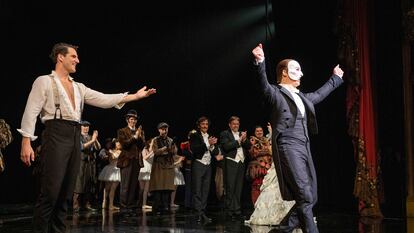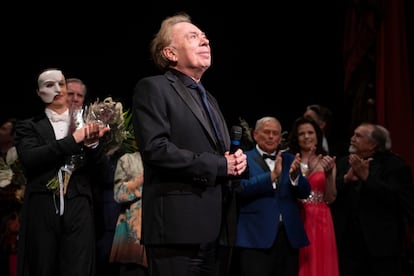‘The Phantom of the Opera’ lowers the curtain on Broadway after 35 years and almost 14,000 performances
The longest-running musical in American history (and Andrew Lloyd Webber’s favorite) says goodbye to New York after nearly four uninterrupted decades

Andrew Lloyd Webber, the most commercially successful European composer of the 20th century, recently buried his son: on March 25, Nick Lloyd Webber died at the age of 43 at the Basingstoke Hospital in Hampshire, England, 18 months after being diagnosed with gastric cancer. But the goodbyes did not stop there, as he has just laid another child to rest — albeit, this time, in the figurative sense. The author of the scores for Jesus Christ Superstar (1970), Evita (1976) and Cats (1981) was seen on Sunday, April 16, visibly distraught, on the stage of the Majestic Theater in New York City, at the last Broadway performance of his favorite musical, The Phantom of the Opera. His most successful play had been staged there since January 26, 1988, when Ronald Reagan was in the White House — in other words, seven presidencies and three recessions ago. Almost 35 years (or 1,790 weeks) passed since; a total of 13,891 performances.
For posterity, it is the longest-running musical in American history; for Lloyd Webber, it is the clearest example of his creative vision, the one with a special place in his heart; the “most successful theatrical entertainment ever engineered,” as the British author wrote in his autobiography. And for New Yorkers, The Phantom of the Opera is, now, a part of history.
Thus ends the most impressive chapter of a story that, in the end, as often is the case, is a love story. In 1984, Lloyd Webber was in love. One of the backup singers of his latest production, Cats, had developed a tremendous voice as a soprano: it was none other than Sarah Brightman, a future star of melodic song and operatic pop. The composer fell head over heels. At that time, he had asked his producers to find him the most romantic story imaginable, and they came upon a 1910 novel by French writer Gaston Leroux about a physically disfigured but highly sensitive composer who, hiding behind a mask in the passageways below the Paris Opera House, tortures the building’s patrons and writes arias for a young and promising soprano with whom he fell in love. It was tragic, historical (it takes place in 1870) and timeless. It was The Phantom of the Opera. That year, Lloyd Webber married Brightman and started to write.
In January 1986, the result began to be shown in London (the final version would be released in October) with Brightman leading the cast. Lloyd Webber, by then an undeniably successful composer, had poured all his expertise into it. Even those who accuse him of having no talent beyond the ability to sniff out lost melodies in compositions by Haydn or Mendelssohn and turn them into best-selling choruses (no small feat), admit that his work had never been so consummate. The musical plays with sounds of progressive rock, similar to the style that Jim Steinman was composing for Meat Loaf at the time (in fact, Steinman was sought out as a lyricist, but he declined) but, instead of maintaining the closeness to Bach that is typical of the genre, it succumbs to the pull of Puccini’s exalted heart.

It is a mishmash, of course: one is never sure if it is an experiment in contemporary opera, a somewhat kitsch satire of the operatic excesses of the 19th century or some hybrid invention that no one has managed to label in four decades. All we know is that, by some alchemy that defies all definition, it works. The story, pure unfiltered melodrama; the impossible lyrics (“I have brought you to the seat of sweet music’s throne”); the unrestrained orchestrations; the fact that a chandelier that weighs a ton falls right on the spectators in the middle of the play: everything has its place and makes it complete. Perhaps a work written from a place of love, without a trace of cynicism, was destined to connect with the audience.
The marriage between Lloyd Webber and Brightman ended in the early 1990s. The Phantom of the Opera went on, and today its story can only be told through records and milestones: it has been seen by approximately 120 million people worldwide (the entire population of Japan!). It has been translated into 17 languages and performed in 45 countries. It has grossed $6 billion, $1.3 billion of them just in New York. In London, it won the Olivier Award for Musical of the Year; in the U.S., it took seven Tony Awards. It has been the gateway to the genre for countless people, and the famous illustration of the Phantom’s mask has become a universal symbol of musical theater, even to its many detractors. Countless plays have been made with more ingenuity, creativity and prestige; still, none comes close to The Phantom of the Opera.
The romance with Brightman might have faded, but Lloyd Webber’s love remained in this production. After it, the composer has penned 10 musicals, although none of them are comparable to this one or any that came before it. Most, in fact, have flopped. The talk in London is that Lloyd Webber relates to the Phantom so much that he never quite let go of the character. He kept track of as many premieres of international productions as he could. He wrote the script for the film version directed by Joel Schumacher, which underwhelmed the critics after its 2004 release. In 2010, he premiered a sequel titled Love Never Dies in London. All the heroes that defeated the Phantom in the first part are there, turned into a bunch of corrupt, alcoholic manipulators. The Phantom, who turns out to have survived without further explanation, is the only good guy in the show and, after achieving moral victory, wins the love of the famous soprano once and for all. It was a critical, creative and economic disaster. Later, in 2018, Lloyd Webber titled his autobiography Unmasked — you draw your own conclusions. It is a cruel irony that the end of the original version of the play that has accompanied and defined him since its creation coincided with the death of his son.
In any case, it is too soon to declare this the end of The Phantom of the Opera. Yes, ticket sales had fallen since the Covid-19 health crisis; but the announcement of the end of the New York performances at the end of 2022 rekindled the audience’s interest, and the box office was pulling in $3 million a week. And yes, it also closed in London in 2020 — but only to be revived the following year in a reduced, cheaper version, with 14 musicians in an orchestra that used to have 27. That, those in the know say, is expected to happen in New York: closing the original production, cutting costs and returning to the usual profits. Meanwhile, versions in Italy, China and Spain (produced by Antonio Banderas) are also being prepared. Phantoms, like children, may go away, but they never go too far.
Sign up for our weekly newsletter to get more English-language news coverage from EL PAÍS USA Edition
Tu suscripción se está usando en otro dispositivo
¿Quieres añadir otro usuario a tu suscripción?
Si continúas leyendo en este dispositivo, no se podrá leer en el otro.
FlechaTu suscripción se está usando en otro dispositivo y solo puedes acceder a EL PAÍS desde un dispositivo a la vez.
Si quieres compartir tu cuenta, cambia tu suscripción a la modalidad Premium, así podrás añadir otro usuario. Cada uno accederá con su propia cuenta de email, lo que os permitirá personalizar vuestra experiencia en EL PAÍS.
¿Tienes una suscripción de empresa? Accede aquí para contratar más cuentas.
En el caso de no saber quién está usando tu cuenta, te recomendamos cambiar tu contraseña aquí.
Si decides continuar compartiendo tu cuenta, este mensaje se mostrará en tu dispositivo y en el de la otra persona que está usando tu cuenta de forma indefinida, afectando a tu experiencia de lectura. Puedes consultar aquí los términos y condiciones de la suscripción digital.









































